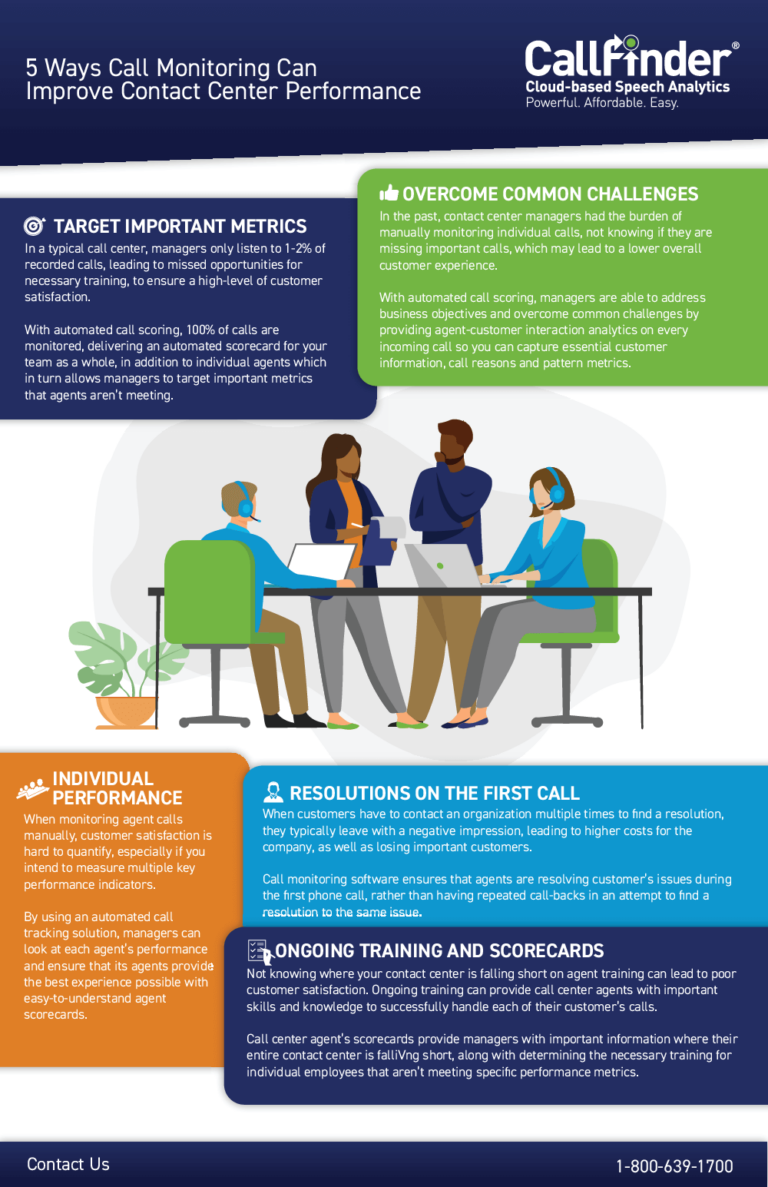Well-trained call center employees are a vital part of any business with a customer service component. Without these skilled representatives, consumers that call in for product or service support are far less likely to have a positive emotional connection to your brand — and possibly take their business somewhere else. Likewise, a lack of proper call center training means outbound calls focused on promotions and surveys simply won’t resonate with customers.
The need for skilled customer service representatives who can leave your customers feeling satisfied is paramount to your brand’s success. Here, we’ll detail the importance of call center training and discuss what agents can reasonably expect from the training. Finally, we’ll talk about quality monitoring as an educational tool for customer service agents.
What is a call center?
A cell center is an asset that companies use to address customer inquiries, needs, and complaints. Call centers are usually designed to handle large volumes of phone calls, both inbound and outbound. The overall goal of a call center is to improve customer satisfaction by addressing consumer needs through proper call center management.
There are three main subtypes of call centers:
- Inbound call centers primarily take calls coming in from customers. This type of call center typically deals with customer complaints.
- Outbound call centers have agents making the calls out, commonly to ask for responses to surveys, sell promotions, or improve sales.
- Virtual call centers are not physical call centers, instead employing agents from various places to make up the remote function of a call center.
Sometimes your call centers will combine attributes of two or more of these subtypes. You may have a hybrid inbound and outbound call center, or you might have a single call center that employs both people on-site as well as people working remotely.
What is the difference between a call center and a contact center?
A call center should not be confused with a contact center. A call center primarily uses telephones to communicate with customers, but a contact center uses many different types of channels. These can include:
- Email communication
- Text messages
- Fax services
- VoIP calling
- Social media
In addition to these, there are many more channels that can be used to communicate with customers. A contact center is typically used for more than just addressing customer concerns. Most contact centers handle specific types of communication, such as telemarketing or customer billing.
What is call center training?
Call center training refers to teaching a new agent how to address customer concerns in a way that leaves a positive impression on the customer. This primarily means teaching agents communication skills. The ultimate goal of call center agent training is to prepare call center employees with the skills needed to handle the challenges they may encounter on the job and maximize customer satisfaction.
Structured courses for call center agent training can be extremely helpful in educating agents on effective and efficient job performance. Without a training program, you’re essentially leaving agents on their own. If you expect your agents to optimize their performance and learn as quickly as possible, you should enroll them in call center training courses.
Why is call center training important?
Whether you’re a large or small business, agent training is critical. To put it simply, a call center training program helps retain customers and keeps them loyal to your brand. According to a 2020 study by Hiver, 30% of consumers won’t give brands a second chance after a single bad customer service experience, and 60% won’t give companies any more chances after two or three bad experiences.
On the other hand, if you consistently provide positive customer service experiences, it creates a positive emotional connection between the consumer and your business. And this leads to high customer retention and loyalty. Few people are customer service professionals by nature. This makes call center training essential for any business with customer service agents.
What is call center training like for agents?
The process of training call center agents doesn’t necessarily need to be difficult. By utilizing good training practices – such as setting clear expectations, creating realistic deadlines, and empowering agents with various types of training to complement their soft skills – you can avoid overwhelming your agents.
The amount of time it takes to complete call center training depends on several factors. These include how skilled you want your agents to be by the end of the course and whether you’re utilizing continuous learning modules. Typically, it can take anywhere between four and 10 weeks to gain the necessary skills for success; however, if you want highly proficient agents, then you should continue their training as a part of a continuing education program.
How long do call center training sessions take?
Call center agent training sessions do not have a specific timeframe. Generally speaking, sessions should be challenging without overwhelming the agent so much that the agent loses focus and makes mistakes. For some, this might be 30 minutes. Others might be able to learn at full capacity for much longer.
You should also set clear expectations for how long you expect an agent in training to complete individual modules. The ideal amount of time set aside for each lesson varies depending on many factors, such as its difficulty and intensity related to the agent’s ability to learn and their innate soft skills.
What is call center training software?
You can find various software solutions designed to teach agents how to be effective call center agents. Some are free, and there are paid options available. Call center training software can be a valuable tool when teaching agents how to perform, especially when combined with quality monitoring, to ensure your agents are living up to expectations.
What does an agent learn during training?
Agents learn a variety of key skills to accompany their soft skills when undergoing call center training, such as:
- Etiquette. This means not just being patient and kind with the customer, but also being communicative. For example, if you need to put a customer on hold, tell them how long they might need to wait before speaking to someone again.
- Active listening. This refers to making sure you fully understand the customer’s questions or concerns and demonstrating that you’ve been conscientiously listening. Callers need to feel that what they’re saying is getting through and you’re willing to help them.
- Tone. Call centers should expect to take calls from difficult customers who are upset and enter the conversation in a negative state of mind. However, it does no good to reflect this tone back at the consumer. Instead, you should practice patience and always keep a positive tone of voice.
These are just a few examples of what skills call center agents can expect to learn during their education.
What does the call center training process look like for an agent?
The process an employee goes through during training can vary depending on the type of education. Some training modules are traditional classroom settings complete with lessons and quizzes. These types of courses will be familiar to most people. Continuous learning programs might utilize software that automatically analyzes agent-customer conversations and offers suggestions after the call. This way, the employee is always learning on the job, even after passing the initial training.
Passing call center training is relatively straightforward but requires diligence and effort. Here are the key points for agents to know during call center training:
- Never be late to a training session. This is one of the only ways a company can fire you during training.
- Get enough sleep. When we sleep well, we retain information much more easily. And you certainly don’t want to appear to be tired during the next day’s training session.
- Take detailed notes that can be reviewed later. You’re less likely to remember the material if you don’t have notes to review later.
- Be open to constructive criticism. This is a good quality to have in general, but it’s even more important if you’re learning. Defensiveness and an unwillingness to learn won’t help you pass the course or help you on the job.
- Practice. Find someone else to practice mock calls with. In fact, this type of drill can make the difference between passing and failing.
- Ask for help from your instructors, peers, and tenured agents. All three groups of people are invaluable resources for call center training, tips, and advice.
As long as you follow this advice, you should have very little trouble passing a call center training program. You’re in the same boat as all the other agents, so help each other out and practice good learning habits.
Why is quality monitoring important to your call center?
Quality monitoring is the process of evaluating interactions between call center agents and customers to assess agent performance. This can be done either manually by listening to calls or through automated software to screen calls. The goal of quality monitoring is to ensure maximum customer satisfaction is achieved by the end of an interaction.
Without quality monitoring, not only will you have little idea how your call center is performing, but your agents will never know when they’re making the same mistakes and they won’t improve.
Is call center training software worth it?
It depends on what you expect to get out of your quality monitoring. As previously stated, you can do this manually or with automated call center quality monitoring software. An automated software solution removes the need for anecdotal evidence to achieve quality assurance. Advanced features also provide many benefits, including:
- Transcription services provide searchable speech-to-text transcriptions so you can easily find anything that was said in the call.
- Scorecards score individual and agent team performance to show you call outcomes at a glance.
- Sentiment analysis and emotion detection offers a visual representation of the agent or customer’s tone throughout the call – was it positive throughout or did it flucuate?
- A cloud-based interface allows you to quickly rewind, fast-forward, or move to specific sections in calls.
- Silence and overtalk detection provides even more detail on what’s happening during calls – are customers on hold too long, or are your agents unprepared?
An automated quality monitoring solution also makes it much easier to follow up with agents and their progress throughout their education. As call center agents gain experience on the phone with customers, a quality monitoring software solution ensures that you get the big picture of your call center performance. You get a better sense of how your customer service representatives perform on a basic level, and you also get in-depth analytics and metrics to help you track performance – whether an employee is underperforming or excelling.
What is the difference between a trained and untrained call center agent?
In a word, it’s consistency. A trained call center agent should always have the ability to leave a customer feeling satisfied in a variety of contexts. This means:
- Sticking to the script. While ideal for ensuring consistency, script compliance is key to avoiding potential fines or lawsuits.
- Maintaining a positive and calm attitude. This is one of the easiest ways to defuse a situation with an angry customer.
- Listening to the customer’s concerns and demonstrating that understanding back to the customer. This includes accurately summarizing the customer’s concerns and repeating it back to them so they know you’ve been listening.
- Having an exemplary knowledge of the product or service. If people are calling to solve a problem they’re having with a product or service, then it’s critical that you understand how to fix the issue. If you don’t have a solution, then you should be able to find someone who can.
In addition, a trained call center agent is ready for the unexpected and can improvise as needed. This is why it’s important to provide the necessary education to prepare them for unanticipated or uncommon situations.
Call center training is a vital part of offering a consistent and satisfactory experience for your customers. This type of education is the difference between a trained and an untrained call center agent. Your company’s reputation and success are determined primarily by the customer’s experience and how call center agents treat them and whether they can solve the customer’s issue.
Call center training: The backbone of a superior customer experience
Hopefully, we’ve given you a detailed definition of call center training, why it’s important, and what a customer service education program entails. You should also have an idea of how you could benefit from an automated quality monitoring program and how to implement it in your call center.
The goal of any call center with a customer service component is to leave the customer satisfied and feeling good about their experience. Agents should feel confident that they have the skills and tools to answer customer questions and respond to their concerns in a way that leaves them feeling better about your product or service than when they first called.
Customers are far more likely to feel a sense of loyalty and keep coming back to you after a positive experience. A top-notch customer experience ultimately comes down to training agents to provide the best experience. If your call center can achieve this, your brand will stand out from the rest.
Contact us today to schedule a demo, and we’ll show you how CallFinder can help you achieve your customer service goals!






